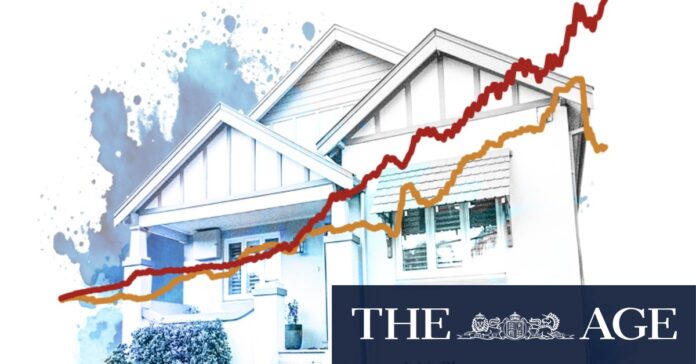[ad_1]
The measure compares the figures at a trend level, which shows the two numbers tend to move in lockstep, outside rapid changes in RBA rates.
“This time around, it’s been a bit odd. House prices started to follow capacity to pay down but turned around and went up again and went to record highs, on CoreLogic numbers, despite capacity to pay remaining pretty poor,” Oliver said.

Economists suspect wealthy buyers were driving up house prices. Credit: Peter Rae
“It looks odd. You have to question whether it’s going to be sustained. That’s the big mystery with that chart.”
Oliver said there were a few potential answers to why the trend had uncoupled, and why house prices could continue to rise.
“Is it the bank of mum and dad? Is it saving buffers built up through the pandemic?” he said. “In most consumer surveys, people are sceptical of housing. You can make the argument that the rebound of prices was because of a narrow group of buyers who were cashed up.
Loading
“Therefore, rebounds have come up on low volumes which may not be sustainable.”
Impact Economics and Policy lead economist Dr Angela Jackson said the decoupling of trends was troubling, because of how much more difficult it would make purchasing property for buyers without access to generational wealth.
“We’ve got to a point where you can’t own a property in this country unless your parents support you, it has a big impact on equity,” she said. “It’s no longer a connection between your own efforts and your rewards in life. That isn’t good for society in terms of equity and future productivity.”
Jackson said she thought the primary way people could afford property at a time when this measure of affordability was deteriorating was through pandemic savings.
“Household savings went up significantly during the pandemic period due to constrained demand and government stimulus, therefore capacity and income have decoupled,” she said. “The lift in savings during the pandemic period has lifted people’s capacity to spend money on property.
“Getting help from parents is becoming more and more common and a bigger proportion of the purchase price, and we expect that to grow as the inheritance from Baby Boomers gets passed into the economy.”
The Property Bureau buyers’ advocate Alastair Mairs said the bank of mum and dad was so prevalent, it was common to see upgrading buyers making use of their parents’ wealth.
“That’s a huge factor. Even second-time home buyers wanting to start a family, they have family pitching in an early inheritance,” he said. “[And] people in the pandemic who saved and lived with mum and dad and all that, they’ve suddenly found themselves in a position to do something.”
Mairs said high interest rates were also pushing mum and dad investors out of the property market because of their high reliance on finance for investing.
“But the rich will get richer, as it always is. It’s the cashed-up investors who are taking the opportunity to make the most of 4 per cent to 5 per cent rental yields,” he said.
[ad_2]
Source link


